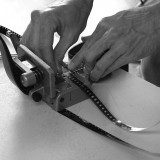The Flatness of Being
Hanson first met Stan during his job working as an Assistant Director in Berlin, and he had a vague feeling of what kind of person Stan was. He was the producer on the show, though the extent of his responsibilities was beyond his knowledge. And through the many interactions he had with him as the interpreter of the crew, Hanson had a sense that maybe Stan was part of those typical Germans who were fastidious about details only to hide the fact that they were not experienced enough. That notion was further confirmed through his talk with another German crew member who was serving as the executive producer on the show that spoke Chinese, English, and German, an elegant lady named Elizabeth who was an Austrian, the daughter of the former ambassador of Austria to China during the 1980s. She was among the many other interesting acquaintances he had known throughout the production whom later on provided him with a letter of recommendation towards a college that he was trying to get in. Surely enough at the time, Stan was not part of Hanson’s list of interesting acquaintances because he was a running gag between Elizabeth and Hanson. His stubbornness and the inability to cope with changes created quite some difficulty for her, particularly when she was the liaison between the Chinese producers and the German counterparts, something Hanson could only imagine since he was mostly working in the assistant director department. But Stan had always been friendly to Hanson, probably due to the fact that their jobs did not overlap, and his fondness of Yi Jing and Hanson’s inherent need to tease were somehow compatible in making small talks that were rooted in the common understanding of the ridiculousness of the circumstances, particularly as outsiders who could only feel a sense of amusement at the bizarreness that took place each day during the production that was at the very best, an invention of what beauty and truth should look like that was completely devoid of reality and truth. In any case, Hanson managed to engage with him during the production with a full awareness of the pain he caused for the poor Elizabeth, yet he somehow created a form of closeness with him centered around a greeting expression named “Go with the flow“, the very idea that drew Stan to the profoundness of Yi Jing and the very principle that he was unable to practice. Stan might found it funny to utter such expression to Hanson, since talking about a romanticized notion of Chinese philosophy to an actual Chinese person might seemed entertaining to his newly acquired foreign friend, but to Hanson it was funny not because of Stan’s fondness of a distorted notion of Chinese culture but because of his unwillingness to let go of control. The juxtaposition between what Stan found to be profound coincided with the very thing that he was unable to practice. Such a relationship between awareness and reality was what amused Hanson, because he was living in this state of confusion during the majority of his life, perhaps even more so ever since he joined the production.
It shouldn’t come as a surprise that when Hanson came to Berlin half a year later, he almost forgot about his experience with Stan, only to encounter him again during a late-night grocery trip half an hour before closing. Hanson saw him right before Hanson walked out the door, and before he could realize it, he had already stepped out of the store, ready to walk home. Then something took hold of him, and he decided to walk back and say hi to Stan without knowing what would happen. The idea of simply saying hi without an agenda seemed distinctly American to him, yet in a new land with new rules, Hanson found it easier to practice his “Americanness“ without the need to blend in. So he did what was foreign to him, saying hi to somebody simply for the sake of doing it. Lo and behold the stunned expression on his face when Hanson greeted him in German (Schön, dich zu sehen) and he replied “Sprichst du Deutsch?“ with bewilderment. Hanson babbled a few words in German only to regress into the comfort of English. They chatted along, then for some reasons he mentioned to Hanson how he would like to learn Chinese. Hanson smiled in glee because he saw this as an extension of Stan’s love for Yi Jing without understanding what it truly entails. It was only later that Hanson started to see how he was projecting his internalized discomfort with his own culture into the poor old Stan who was probably pure in his motive in learning the mystical revelations that were deeply rooted in the Eastern traditions, as ludicrous as it sounds. One thing led to another they exchanged numbers and made a casual proposal to be Tandem partners, an arrangement in which he would teach Stan Chinese while Stan would teach Hanson German. They left it at that, and Hanson said his goodbye, thinking this was probably one of those small talks that would lead to nothing of substance. A few days later Stan texted Hanson regarding the proposal to be Tandem partners and only then did Hanson acknowledged the seriousness of Stan’s intention. And thus began their journey towards a closeness that Hanson never would have imagined.
The first realization he experienced was how lively Stan could be outside the context of work. He would always smile at him when Hanson stood at the door and offered him coffee or water as he walked in. Hanson was jealous of his spacious apartment, which had one living room full of sunlight, a balcony, two separate bedrooms, and a kitchen, with only a rent of nine hundred euros per month, a steal in the current market and a great step-up to Hanson’s living condition at the time, which consisted of one studio room with one sofa that also served as a bed, overlooking a busy street that was never quiet except on Sundays when all the shops would close to honor the virtues of Jesus. Every time when Hanson sat with him on the sofa in his living room, Hanson would be surprised at the genuineness of his willingness to learn with a hint of lightheartedness, which ran a stark contrast to his uptightness during the production from the year before. He distinctly remembered how Stan barged into the office of the assistant director full of repressed anger and asked Hanson to translate how important it was that the information in this office should not be leaked into the other office, which was consisted of location managers who were trying to secure permits on a tight schedule. In a way his fury was partly Hanson’s fault, because Hanson told one of the location managers, Dany, that the actual shooting days would be 26 days instead of the originally planned 31 days, drastically changing their perception of the schedule and implying a rise of unwanted workload. That information was correct, of course, yet it came from an unofficial source, which was Hanson, a lowly assistant director who had no idea what kind of politics was happening in the scene. Stan was upset that his team was constantly disturbed by rumors that shook their confidence in the project, though once again, not rumors, only truths that were revealed in an unexpected way, a way beyond the control of Stan, which only irritated him even more. Hanson later learned from a different source that the Chinese art director at the time was also unhappy about Hanson’s meddling, for how could he tell the Germans everything? (A betrayal to his country, surely.) Yet it was in Hanson’s opinion that information transparency was at the very core of effective productions. Then again, he was young and newly graduated from college without an understanding of the real world. Perhaps transparency without a filter is simply another form of destruction.
When Hanson started to see Stan in a brand new light, with the memory of him holding down his anger rather unsuccessfully in that production office, he found it interesting that conflicting experiences could exist at the same time. One might assume that Stan was an uptight person incapable of loosening up in real life when, in fact, he was absolutely capable of being lighthearted and engaging. It’s funny how the work context could change people so drastically. Had Hanson not said hi to him at that particular branch of discount supermarket named Lidl, Stan would always be remembered as a caricature of a person who was deeply German, unwilling to be flexible, and just plainly old and uninteresting.
As time passed on during their sessions together, Hanson started to grow fond of Stan, who turned out to be a someone with many fascinating experiences. He was in his sixties, with three ex-wives, one in Germany, one in Iceland, and one in Canada. He had three children, each of which was the product of each failed marriages. His youngest child was a ten-year-old boy living in Canada with his black mother, a mix-race kid who was also on the screensaver of Stan’s old iPhone 5. To imagine that he probably had this kid in his fifties brought a mischievous smile on Hanson’s face. Someone had been naughty. When Hanson asked him about the marriages, rather intrusively, he replied with a lively answer: “Oh, I got married so I could stay in the country.“ In Hanson’s limited perceptions of the world, the idea of marrying someone in order to stay in a country is something distinctly Asian, or at least more popular in countries in which lives are not easy. But seeing how a white male in his sixties would also marry for the sake of obtaining visa is something refreshing, or maybe Stan was only phrasing his marriages this way as an attempt to hide something he wasn’t comfortable in sharing. Hanson learned that his German daughter, which was the oldest of three, a doctor working in Berlin who also lived with a man and two children outside the institution of marriage, went to therapy three times a week just to keep the relationship going. He also mentioned how his son, who doesn’t speak German, often complained to his friends about how his father was some old loser guy in Germany who was never present in his life. The fact that Stan told Hanson this with a relaxed attitude only made Hanson felt more sorrowful. When Hanson asked Stan if he was sad about what his son had said, he only shrugged it off with the cliche response that there wasn’t anything he could do. Stan had always been a person who enjoyed freedom and living as a foreigner. To ask him to settle down was probably against his nature, and in the face of nature, the inevitable hurt he caused to other people was probably something that can only be accepted rather than being ruminated upon. He had made his choices a long time ago. Even though Hanson could see that he was trying to make amends, Stan would never admit to these descriptions. He had Fortnite on his iPad because his son liked this game. He was also learning game design and how to draw anime because they were the interests of his son. During the summer his son would come to Berlin and spend a month with him. He loved him in his own way, and it was quite touching for Hanson to see a man in his sixties, learning the newest technologies in an attempt to have connections with his son, knowing how much his absences had hurt him. And here he was, learning Chinese purely out of interest, not because he was trying to conduct businesses in China. Hanson cannot help but wonder what he would be like when he turned sixty. Would he be so open to try new things? Would he have found love? Would he have settled down, or still out there enjoying being a foreigner in a strange land? Those are the questions only the future Hanson would know.
Yesterday when Hanson commented on how most furniture in his place was from IKEA, Stan replied that apart from the socialist idea of having the same thing for everyone, he deliberated bought IKEA because he thought when the time comes to say goodbye, he could just pack up and go without looking back. He did get rid of all of this stuff once in this fifties, right after his last divorce, when he was on the street of Canada with nowhere to go. Though he regretted throwing away all the letters, he was mostly liberated from this decision. He then told Hanson how in five years he would like to settle down, and buying IKEA was part of the preparation to say goodbye when that day arrives. Somehow it made Hanson sad to hear his plan for the future after all the stories he had heard from him. Stan the wanderer, who had an inherent need to move around and do what he chose, had finally caved in to the idea of settling down. Hanson asked him where he would like to settle down. Asia? America? Australia? After a brief pause he said he found Iceland to be the place, and the calmness of his voice made Hanson feel that as much as Stan would like to see himself as this wanderer who only made decision at the last minute, who only listened to his heart at each moment, he had already decided where he would end up. When Hanson asked him if he made that choice to settle down out of the pressure of the society, he only said that after a certain point, life would simply make the decision for you. I am old, he said, the first time he admitted the significance of his age since the year they had been knowing each other. After Hanson heard this admission, a relief covered in sadness arose in his chest. He was relieved to know that a sense of closure and order would finally come into Stan’s life, ending his perpetual search for something more. But he was equally sad to know that Stan had given in to the limit of his time, finally admitting that he did not come into this world with infinity. Hanson remembered how one should not see the Earth as flat but as a sphere. When we see the Earth as flat, we assume it’s infinite, and with the assumption of infinity, we squander our lives. But if we see the Earth as a planet, as a sphere floating in space, we would then realize that the recourses are limited, and we must do everything we can to treasure it. A simple shift of perspective would lead to a completely different way of behaving.
Something shifted for Hanson when he said goodbye to Stan that evening after their usual Tandem session. In a way, they had already said their goodbyes from a long time ago, fully aware that things would not be the same forever. Stan said maybe five years is an arbitrary number, and maybe he would settle down in eight years. Who knows? He remarked. He would know when clarity hit him. Somehow Hanson knew that Stan already knew the clarity he desired was in him all along. He just won’t acknowledge it yet. As he closed the door behind him and walked towards the S-Bahn in the direction of Friedrichstraße, Hanson was unable to describe his feelings, only to notice the cool summer evening air, with a setting sun in the distance, promising for a return.











